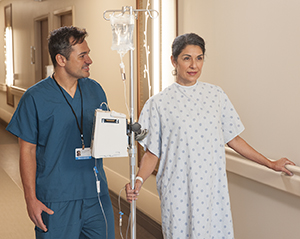After Incontinence Surgery: Recovering in the Hospital
When the surgery is done, you’ll go to the PACU (postanesthesia care unit). It is also called the recovery room. You’ll stay in the PACU until you’re fully awake. This is often a few hours. You’ll then go to a regular room. Your hospital stay may last from 1 to 3 days.
In the PACU
When you first wake up, you may feel groggy, shaky, or cold. The surgery may make it hard for you to urinate. This may last for a few days or even a few weeks. You may have a small tube (catheter) in your bladder to help it drain. One kind of catheter, called a Foley catheter, may be put into your bladder through the urethra. Or a suprapubic catheter may be placed in the bladder through a small incision in the lower abdomen. It is normal for your urine to have some blood in it after surgery. Other tubes may help drain blood and fluid from your incision. I.V. (intravenous) lines give you fluids, nutrition, and medicine. If you have a vaginal incision, you may have gauze packing in the vagina for 24 hours.
In your hospital room
Once you’ve been moved to a regular room, family and friends can visit you. The I.V. lines and catheter will remain in place for a while. Health care providers will check on you. As your intestines may take a day or so to recover, you may have gas pains. To help your intestines recover, it may be 24 hours before you are given any food to eat. You will have compression devices on your calves to prevent blood clots. Your team may also encourage you to do deep breathing exercises. You might have a device called a spirometer to help keep your lungs clear. This reduces the risk of lung infection (pneumonia).
Managing pain
To control pain from the surgery, the nurse may give you medicine. Or you may have a patient-controlled analgesia (PCA) pump, which is attached to an I.V. line. This pump lets you give yourself pain medicine. It is normal to feel some pain at first. But if the pain bothers you, tell your nurse right away. Don’t wait until the pain gets bad before you mention it.
Getting up and walking
The day after surgery, you may be helped to get up and walk. At first, you may not walk far. But walking keeps your blood moving and helps prevent blood clots. Once you can get out of bed, you may be helped to the bathroom to see if you can urinate. You may still notice some blood in your urine. This should go away in a few days. Once you can stand on your own, you may be able to take a shower.
 |
| Walking soon after surgery helps prevent blood clots and breathing problems. |
Your catheter
If you have a catheter, it may be removed before you leave the hospital. In some cases, it may need to stay in your bladder for a few more days. If you are sent home with a catheter, you will be shown how to care for it.
Going home
Your provider will let you know when you can leave the hospital. Have an adult friend or family member drive you home. Take care of yourself at home as instructed. Be sure to schedule any needed follow-up visits with your provider.